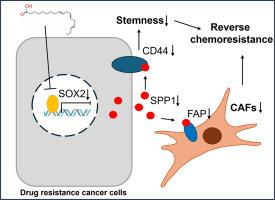α -亚麻酸通过抑制分泌的磷酸蛋白1表达和肿瘤干性逆转结直肠癌耐药。
IF 8.3
1区 医学
Q1 CHEMISTRY, MEDICINAL
引用次数: 0
摘要
背景:化疗仍然是结肠癌的主要治疗方法,但耐药的发展限制了其疗效。迫切需要开发一种更有效的治疗策略。α -亚麻酸(ALA)作为人体必需的营养物质,已被发现可以提高化疗药物的治疗效果。目的:探讨α -亚麻酸逆转结肠癌化疗耐药的潜在机制。结果:ALA逆转结直肠癌化疗耐药,抑制耐药结直肠癌细胞的干性。SPP1在ala诱导的化疗耐药逆转中起关键中介作用;它的下调破坏了与下游受体CD44的相互作用,从而减轻了化疗耐药性。随后,ALA抑制SOX2的表达,SOX2是一种促进SPP1转录的转录因子。进一步分析表明,SPP1表达降低导致FAP水平降低,而FAP是癌症相关成纤维细胞(CAFs)的标志物,SPP1和FAP之间存在功能相互作用。有趣的是,ALA破坏了SPP1和FAP之间的相互作用,从而阻止了CAFs的积累。体内研究证实,ALA通过SOX2/SPP1/FAP信号轴逆转结直肠癌化疗耐药。结论:本研究表明,藜麦中的ALA通过SPP1抑制结直肠癌的发生,减少CAFs的数量,从而逆转化疗耐药。这些发现强调了ALA作为一种有希望的膳食辅助剂,可以提高结直肠癌化疗的疗效,并为靶向肿瘤干性和基质重塑提供了新的机制见解。本文章由计算机程序翻译,如有差异,请以英文原文为准。

Alpha-linolenic acid reverses colorectal cancer drug resistance by suppressing secreted phosphoprotein 1 expression and tumor stemness
Background
Chemotherapy remains the main treatment for colon cancer, but the development of resistance has limited its efficacy. There is an urgent need to exploit a more effective therapeutic strategy. Alpha-linolenic acid (ALA), as an essential nutrient for the human body, has been found to increase the therapeutic effect of chemotherapy drugs.
Purpose
Exploring the potential mechanism of alpha linolenic acid reversing chemotherapy resistance in colon cancer.
Results
ALA reverses chemoresistance in colorectal cancer and suppresses stemness in resistant colorectal cancer cells. SPP1 functions as a key mediator in ALA-induced reversal of chemoresistance; its downregulation disrupts the interaction with the downstream receptor CD44, thereby mitigating chemotherapy resistance. Subsequently, ALA inhibits the expression of SOX2, a transcription factor that promotes SPP1 transcription. Further analysis reveals that decreased SPP1 expression leads to reduced levels of FAP, a marker of cancer-associated fibroblasts (CAFs), and that a functional interaction exists between SPP1 and FAP. Interestingly, ALA disrupts the interaction between SPP1 and FAP, thereby preventing CAFs accumulation. In vivo studies confirm that ALA reverses colorectal cancer chemoresistance via the SOX2/SPP1/FAP signaling axis.
Conclusion
The study demonstrates that ALA in quinoa depresses the stemness of colorectal cancer and reduces the number of CAFs via SPP1, thereby reversing chemotherapy resistance. These findings highlight ALA as a promising dietary-based adjuvant for enhancing chemotherapy efficacy in colorectal cancer and provide new mechanistic insights into targeting tumor stemness and stromal remodeling.
求助全文
通过发布文献求助,成功后即可免费获取论文全文。
去求助
来源期刊

Phytomedicine
医学-药学
CiteScore
10.30
自引率
5.10%
发文量
670
审稿时长
91 days
期刊介绍:
Phytomedicine is a therapy-oriented journal that publishes innovative studies on the efficacy, safety, quality, and mechanisms of action of specified plant extracts, phytopharmaceuticals, and their isolated constituents. This includes clinical, pharmacological, pharmacokinetic, and toxicological studies of herbal medicinal products, preparations, and purified compounds with defined and consistent quality, ensuring reproducible pharmacological activity. Founded in 1994, Phytomedicine aims to focus and stimulate research in this field and establish internationally accepted scientific standards for pharmacological studies, proof of clinical efficacy, and safety of phytomedicines.
 求助内容:
求助内容: 应助结果提醒方式:
应助结果提醒方式:


